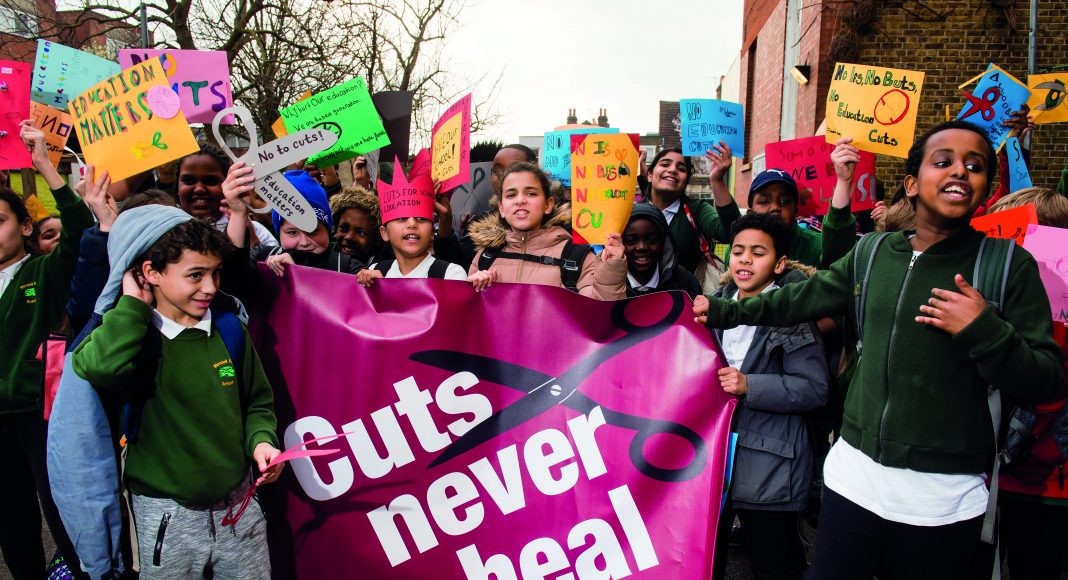Schools across England are being forced to pay millions of pounds, money that is desperately needed for teaching staff and resources, to private companies for useless activities and substandard services. Over 900 of the country’s schools are locked into contracts under the Private Finance Initiative (PFI) scheme introduced in 1992 by the Tories and increased massively under the succeeding Labour government. PFI and the private-public partnerships (PPP) it creates, are one of the tools used by capitalists to extract profit from public services, siphoning off resources from socially produced wealth (in the form of taxes) into private pockets. As well as impacting education, PFI was expanded by Labour with devastating consequences for services such as transport and healthcare.
Middlefield Primary in Speke, Liverpool, is one school trapped in such a contract, forced to hand over £470,000 a year (20% of its total budget) to a PFI company for ‘services’ it either doesn’t need, or could get cheaper elsewhere. For example, headteacher David Potter revealed in February that the terms of the contract require that the playing field grass must be kept to 2.5cm high, even in winter when the field is barely used. While he struggles to pay his teaching staff, Potter said, ‘come rain or shine every week, the [PFI] grounds maintenance team come out and they cut this field’, as the school is robbed of ‘the freedom to say, actually, we think we can do without’. The school cannot escape from the contract as Labour-controlled Liverpool City Council is unwilling to pay the legal fees. The strain on the school’s budget means four members of classroom staff have not been replaced since 2020.
Real-terms cuts to schools’ budgets have affected the most vulnerable children the worst, since the Tories came to power in 2010. Secondary schools in the poorest areas saw per pupil funding fall by 12% between 2010 and 2021, compared with 5% in the wealthiest areas, according to the Institute for Fiscal Studies. Meanwhile, while working class children, including in particular those with special educational needs, bear the costs of austerity, private investors have made at least £140m from PFI deals in Yorkshire alone.
PFI was only ever a scheme to stuff the wallets of investors, and it became increasingly impossible to convince the public that it provided any social benefit, particularly following the collapse of PFI giant Carillion in 2018, which resulted in the loss of 43,000 jobs, the implementation of emergency measures in 14 hospitals, and at least one fire service being asked to step in to deliver school meals. The delivery of at least three hospitals was delayed, with one, the Royal Liverpool, opening five years behind schedule and £250m over budget in 2022 – after the government had had to fork out £42m to PFI investors to terminate the contract early. The government abolished PFI, at least in name, following the Carillion disaster, but the contracts are binding for an average of 31 years, meaning many schools and other public services will continue to suffer for decades to come. Meanwhile, capitalism means that private companies still need to strip surplus value from public assets in order to maintain profits, and therefore public-private collaboration continues under different guises.
The backroom deals made by the government with private companies for substandard personal protective equipment (PPE) during the Covid-19 pandemic are well documented. Nevertheless, in 2022, the Local Government Association commissioned Partnering Regeneration Development ltd and Newbridge Advisers to produce a ‘good practice guide’ to PPPs, insisting that these profiteering relationships could yet ‘unlock a range of social, environmental, and economic benefits aligned to local and national priorities’. The urgent need for climate change mitigation provides a particularly fruitful source for investors looking to leech off public services. The UK Infrastructure Bank, set up in 2021, has £4bn with which it aims to ensnare local authorities in up to 50-year loans for projects to provide ‘green’ energy, transport, waste, water, and digital infrastructure. The history of PPPs shows that these loans will do nothing to protect communities from the effects of climate breakdown, and will only line the pockets of investors.
The Procurement Act 2023, designed, in the overnent’s words, to ‘bring about a more flexible, strategic approach to public procurement,’ will come into effect in October 2024. The Department for Education is pushing schools to embrace the changes through its ‘Get help buying for schools’ service. The reality is that the Act, like all post-2018 schemes to retain PFIs in all but name, is an attempt to sanitise and normalise the gutting of public services for private profit. Only socialism, under which private ownership of vital services is impossible, can provide for the needs of the working class.
Felix Lancashire
FIGHT RACISM! FIGHT IMPERIALISM! 299 April/May 2024




